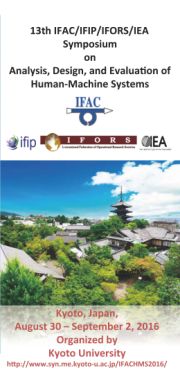Topics
The objective of the symposium is to provide an international forum for the exchange and sharing of the latest scientific and technological developments in human-machine systems research. The symposium highlighted the transformative impacts in research, theory, and application that are the result of recent technological advances. The objective of this symposium is to exchange ideas and further understanding in the areas of Human-Machine Systems, Human-Computer Interaction, Intelligent and Autonomous Systems and Decision Support Systems, etc. Indeed, nowadays progressive system redesigns are needed with respect to human computer/machine interactions to increase system reliability and transparency by increasing human-system interactions, and especially a human user's proactive participation, rather than by eliminating the human out of the loop. Such a view on the human-machine system design regards a human and an automated agent as equivalent partners, and through their mixed-initiative interactions some novel relations of mutual dependency and reciprocity would emerge as well as flexible changes of role-taking are expected. At the same time, however, introducing new technologies may bring about a new type of complex interactions among elements, and analysis is becoming necessary to focus not only on ‘Sharp-Ends’ which immediately cause unsafe event but also ‘Blunt-Ends’ which consists background of unsafe event. This is the critical feature of the socio-technical systems and is set as a main theme of this symposium at Kyoto, Japan.
Analysis, Design, and Evaluation of Human-Machine Systems
- Human-centered design and automation.
- Methodology, principles, practice.
Analysis
- Cognitive task analysis, task and function allocation.
- Risk assessment, accident analysis, and operational risk analysis.
- Modelling of human performance, reliability, and mental workload.
Design
- Work organization, job design, and team design.
- Graphical interfaces, auditory interfaces, multimedia design.
- Multi-modal interactions in real and virtual environments.
- Functional and adaptive interfaces, interface agents.
- Intelligent and agent systems, neural networks, fuzzy logic, genetic algorithms.
- Support for operational risk management, system operation, maintenance, and supervision.
- Information management and knowledge retrieval.
- Barrier free and changeable designs.
Evaluation
- Evaluation of performance, usability, safety, and workload.
- Laboratory simulation, field experiments and observation.
Remote, Network and Internet Systems
- Intelligent interfaces.
- Real and virtual environments.
Human/Humane Aspects of Human-Machine Systems
- Decision making and cognitive processes.
- Human operator support.
Application Domains of Human-Machine Systems
- Transportation Systems.
- Work organization.

